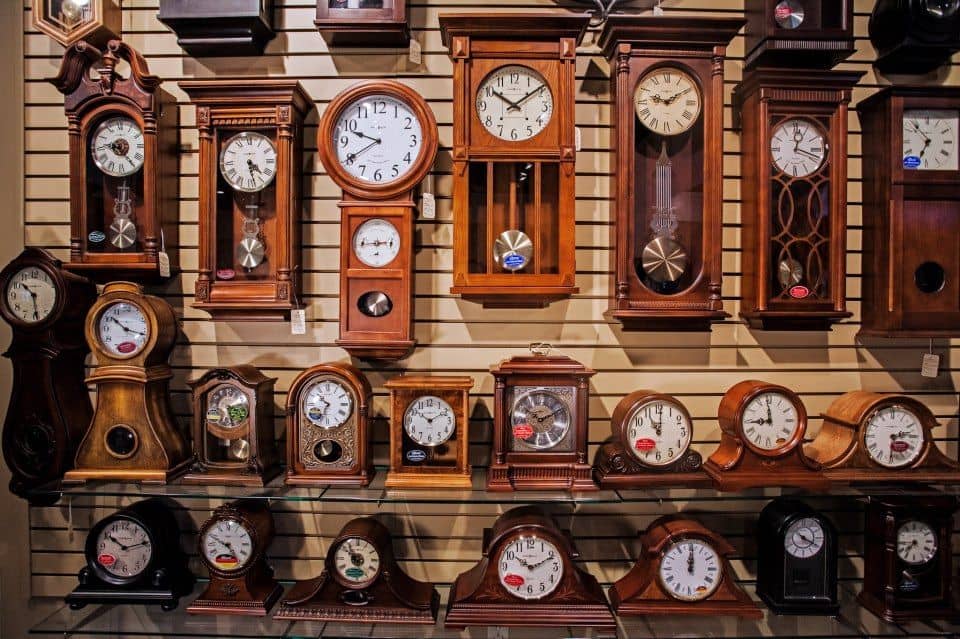
Clocks have always been an integral part of our lives, helping us measure time with accuracy and keeping us organized in our day-to-day activities. From the earliest sundials of ancient civilizations to the latest high-tech digital timepieces, the evolution of types of clocks showcases the remarkable progress of human innovation and technology.
In this comprehensive guide, we’ll explore the rich history of timekeeping, highlighting the different types of clocks with names and images that have shaped our world. We’ll also delve into their significance in home decor Vastu principles and offer tips on selecting the perfect clock to complement your living space. Whether you’re interested in classic designs or modern styles, understanding the various types of clocks can help you find the ideal timepiece for any setting.
Different Types of Clocks: Understanding Their Unique Features and Benefits
Clocks are not just practical tools; they also serve as beautiful decor pieces that can enhance the aesthetics of any room. Let’s explore some popular types of clocks and their distinctive features, pros, and cons. Whether you’re looking for a classic touch or a modern flair, there’s a clock to suit every taste and need.
1. Analog Clocks
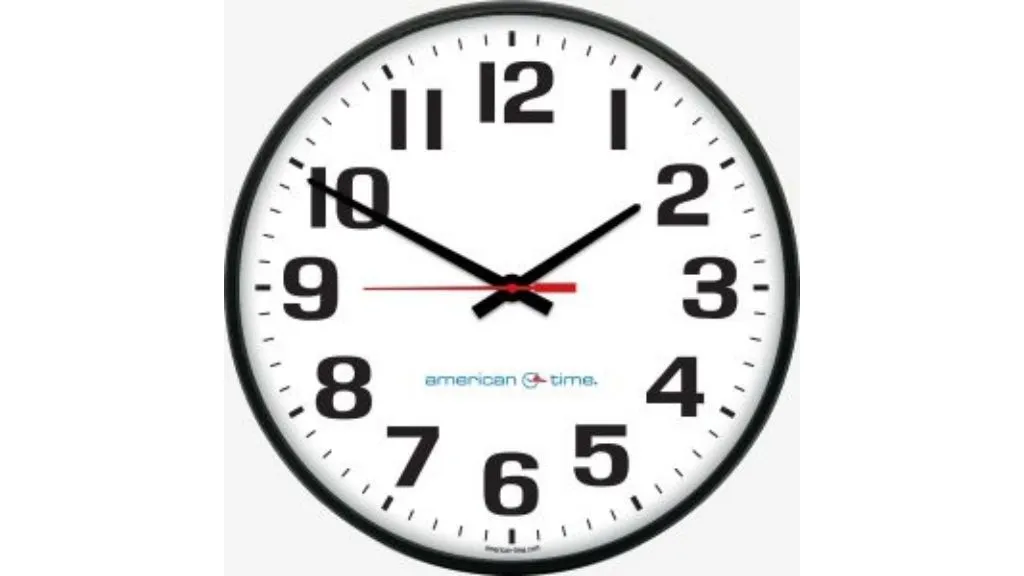
Analog clocks are the epitome of traditional timekeeping. These clocks feature rotating hour, minute, and second hands that move in a circular motion, making them a timeless addition to any setting. Analog clocks are ideal for spaces like living rooms, bedrooms, or offices where you want to add a classic touch.
Pros:
- A timeless design that never goes out of style.
- Easy to read with a clear display of time.
- Perfect for home decor, adding elegance and sophistication.
Cons:
- Requires manual adjustment for daylight saving time.
- Needs occasional battery replacement.
Examples:
- Seiko Wall Clock: Known for its precision and durability, ideal for living rooms.
- Rolex Desk Clock: Adds a luxurious touch to office desks.
Analog clocks come in various clock shapes such as round, square, and even octagonal, making it easy to find one that matches your decor.
2. Digital Clocks
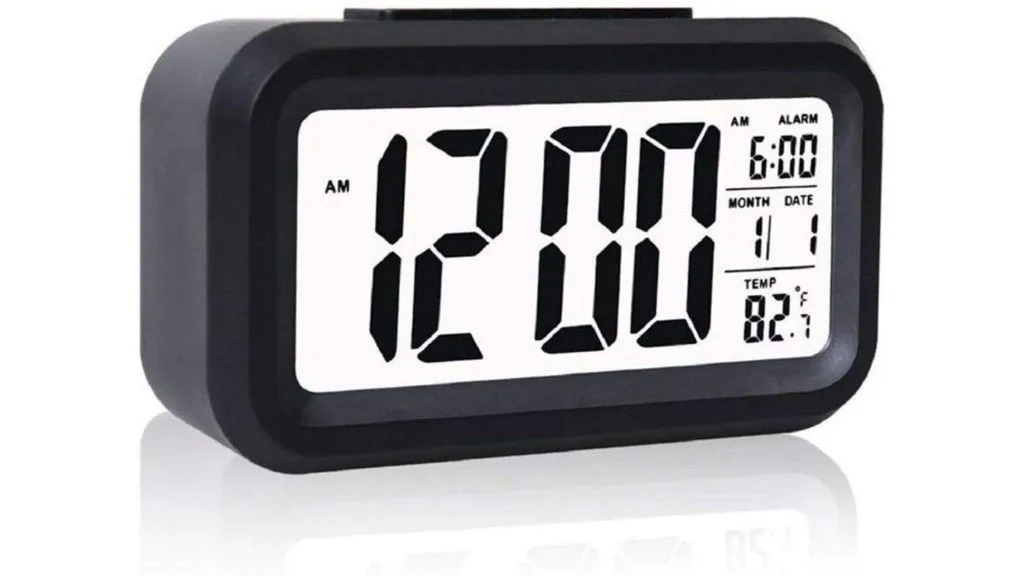
Digital clocks display time in a numerical format and are often equipped with additional features like alarms, temperature displays, and backlighting. These clocks are highly functional, making them a popular choice for bedrooms, study rooms, or offices. They are also helpful as a clock project for grade 3 students, helping them learn to tell time with ease.
Pros:
- Easy-to-read digital display, especially in low-light conditions.
- Multifunctional with alarms, timers, and even USB charging ports.
- Provides accurate timekeeping with minimal adjustment.
Cons:
- Requires batteries or electrical power to operate.
- Can lack the traditional charm of analog designs.
Examples:
- Casio Digital Alarm Clock: Ideal for bedside tables with multiple alarm settings.
- Philips Wake-Up Light Alarm Clock: Mimics sunrise to wake you up gently.
Digital clocks are available in different clock shapes and sizes, including compact rectangular designs perfect for travel or large displays suitable for classrooms.
3. Wall Clocks
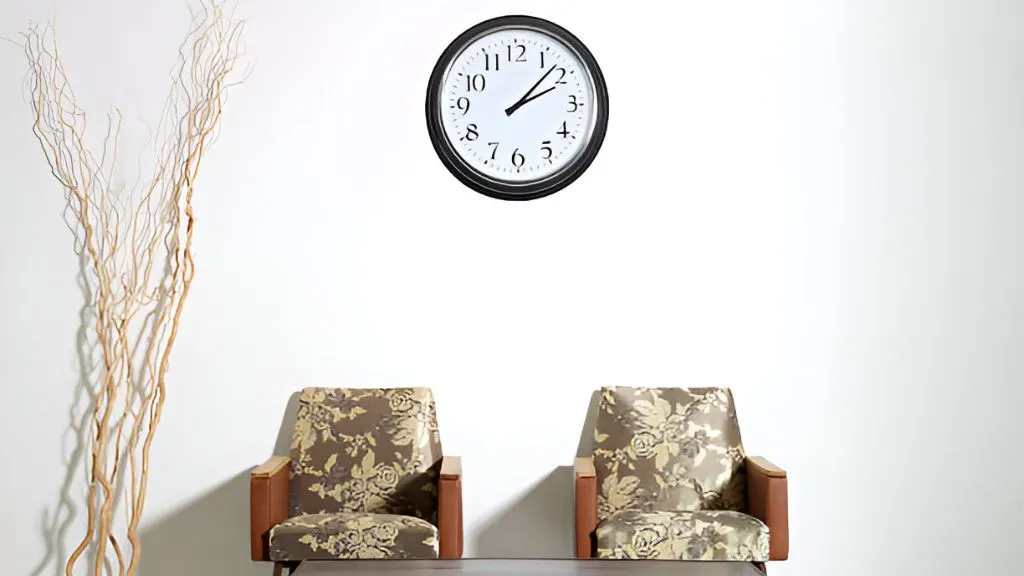
Wall clocks are versatile timepieces that can enhance the decor of any space. These clocks come in a wide range of designs, sizes, and clock shapes, making them suitable for any room, whether it’s the living room, kitchen, or hallway. Wall clocks are also a great way to create a focal point in your decor.
Pros:
- Wall clocks come in various styles and clock shapes, allowing you to choose one that complements your interior decor.
- Unlike floor or tabletop clocks, wall clocks do not take up surface space, making them ideal for smaller rooms.
- Large wall clocks with bold numbers or markers are easy to read from a distance, adding convenience to any room.
Cons:
- Wall clocks require a sturdy wall for installation, limiting their placement options in rooms with limited wall space.
- If not securely mounted, wall clocks can fall and get damaged, especially heavier models.
- Most wall clocks run on batteries, which require periodic replacement, making them less convenient than plug-in options.
Popular Brands:
- Ajanta: Known for affordable and stylish wall clocks.
- Citizen: Offers a blend of functionality and elegance.
- Howard Miller: Renowned for its antique and decorative wall clocks.
Check out wall clock images online to find inspiration for your home decor and discover how different styles can transform your space.
4. Grandfather Clocks
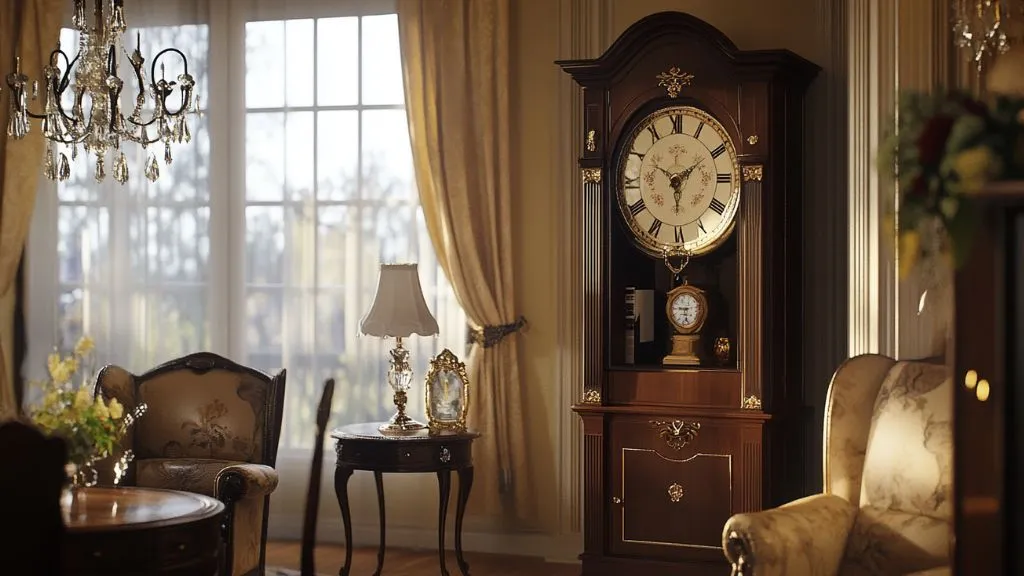
Grandfather clocks are tall, freestanding clocks with a swinging pendulum. These iconic timepieces are often seen in traditional homes and add a sense of grandeur and history to any space. They are perfect for creating a classic, vintage ambiance.
Pros:
- Antique charm that can become a family heirloom.
- Adds a sense of elegance and sophistication to large spaces.
- The rhythmic ticking sound is often soothing.
Cons:
- Requires regular winding and maintenance to keep them accurate.
- Can be bulky, needing ample space.
Grandfather clocks are typically found in grand entryways or living rooms, becoming the centerpiece of the decor. Their detailed clock details, like ornate carvings and brass finishes, add a touch of luxury to any home.
5. Cuckoo Clocks
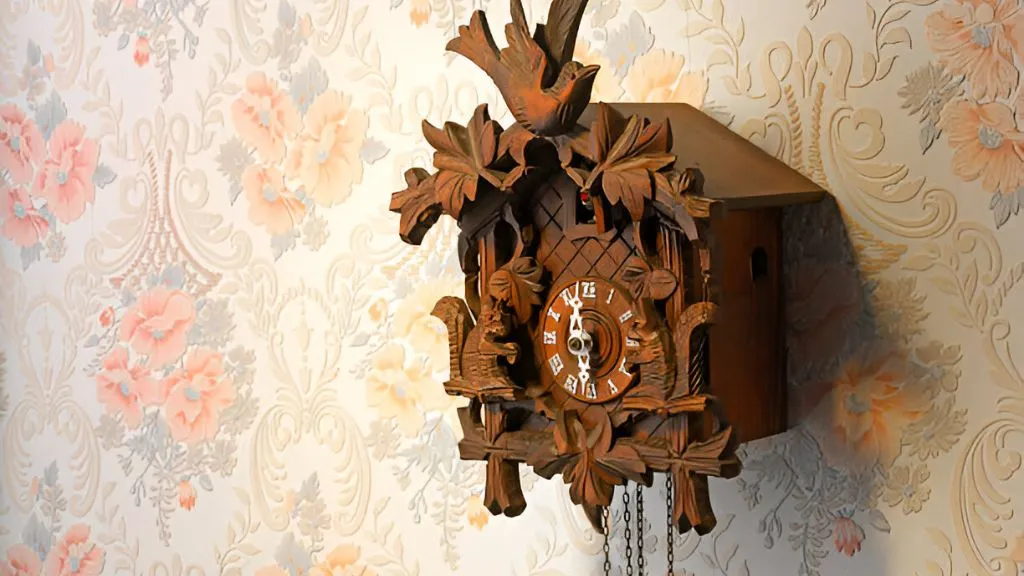
Cuckoo clocks are charming timepieces that originated in Germany. These clocks are famous for their miniature bird that pops out to announce the hour with a cheerful “cuckoo” sound. They are perfect for adding a whimsical and unique touch to your decor.
Pros:
- Highly decorative, serving as a conversation starter.
- Adds a touch of European charm and nostalgia to any room.
- Available in various designs, from traditional wooden carvings to modern takes.
Cons:
- Can be noisy, especially if the cuckoo sound goes off every hour.
- Requires regular maintenance to ensure the bird mechanism works smoothly.
Cuckoo clocks are great for spaces like kitchens or dining rooms, where their playful nature can be fully appreciated. These clocks also come in different clock shapes and sizes, from compact models to elaborate designs with multiple moving parts.
Unique Clocks Based on Functionality
1. Atomic Clocks

Atomic clocks are the gold standard when it comes to timekeeping. These highly precise clocks use the vibrations of atoms, usually cesium or rubidium, to measure time. They are so accurate that they are often used in scientific research, global positioning systems (GPS), and for international time synchronization. If you’re looking for unmatched precision, atomic clocks are the pinnacle among all types of clocks.
Pros:
- Atomic clocks can maintain precision to within a fraction of a second over millions of years, making them the most reliable timekeepers.
- Their accuracy ensures that they are crucial for applications like satellite navigation, astronomy, and scientific experiments.
Cons:
- Due to their complex technology, atomic clocks are costly and not typically found in household settings.
- They require specialized knowledge to set up and maintain, making them impractical for everyday use.
Atomic clocks are typically found in research laboratories, space stations, and international timekeeping centers where precision is critical.
2. Smart Clocks
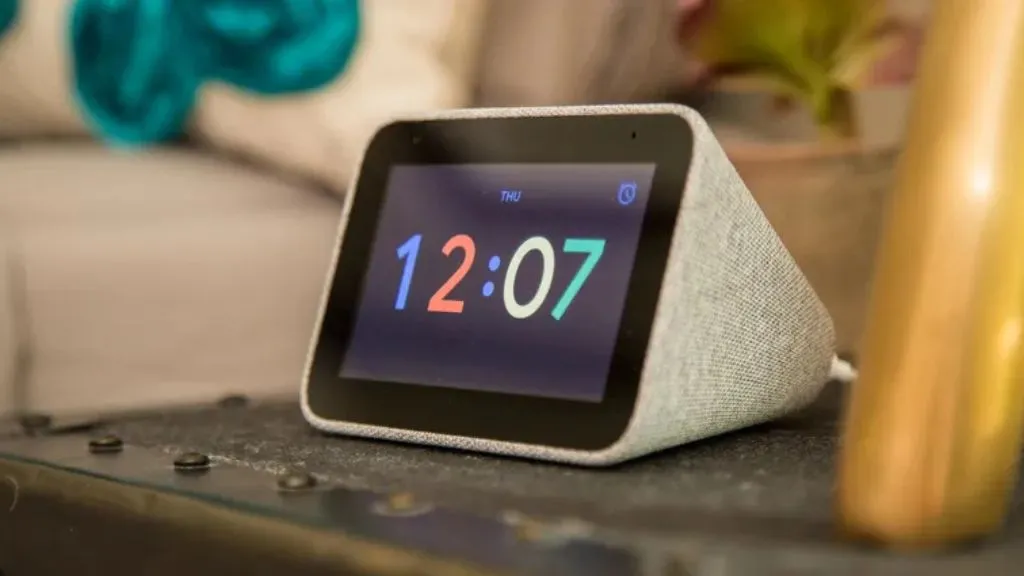
Smart clocks represent the modern evolution of timekeeping, integrating advanced technology to offer much more than just displaying the time. These clocks can connect to your home network, allowing you to control alarms, reminders, and even home automation features with voice commands or through smartphone apps. Among the different types of clocks, smart clocks are perfect for tech-savvy individuals who want a multifunctional device.
Pros:
- Beyond telling time, smart clocks can stream music, display weather updates, control smart home devices, and more.
- Using assistants like Alexa or Google Assistant, you can easily set alarms, check calendar events, or control connected devices with voice commands.
Cons:
- To unlock their full potential, smart clocks need a stable internet connection and compatible devices.
- As they often have microphones, some users may have concerns about privacy and data security.
Examples:
- Google Nest Hub: Offers a smart display with Google Assistant, perfect for managing your smart home.
- Amazon Echo Show: Combines a digital clock with a smart display, allowing for video calls, streaming, and smart device control.
Smart clocks are versatile additions to any room, especially bedrooms and offices, where they can streamline your daily routine with convenience and innovation.
3. Projection Clocks
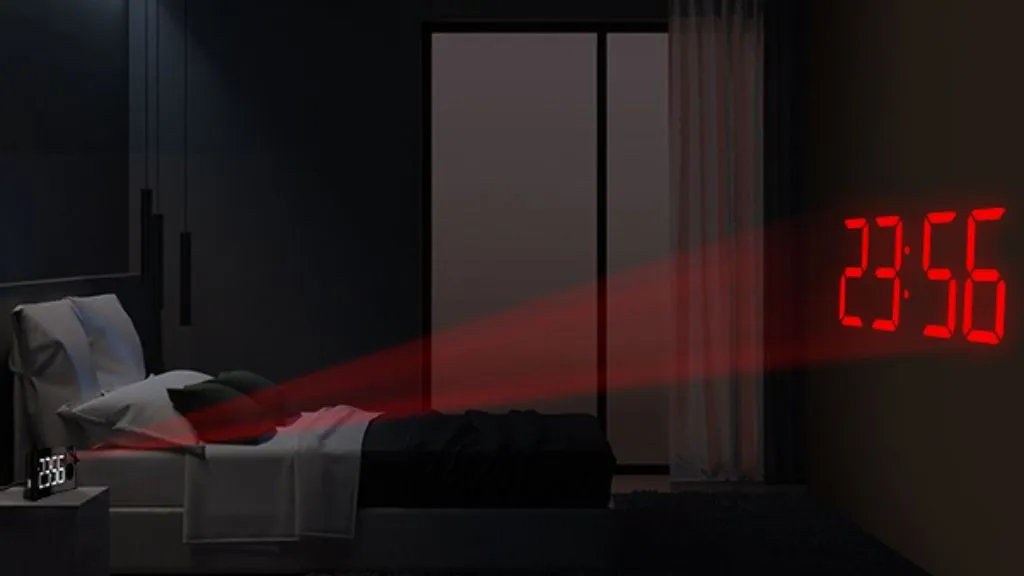
Projection clocks offer a unique and innovative way to check the time. These clocks project the time onto a wall or ceiling, making them particularly useful for bedrooms. You can easily see the time at night without having to turn on any lights, making them a great option for people who want convenience in the dark. This is a modern twist on traditional types of clocks.
Pros:
- The projected time is large and clear, perfect for checking the time at night without disrupting your sleep.
- These clocks add a futuristic touch to your bedroom or living space.
Cons:
- While functional, projection clocks often focus more on utility than style, so there may be fewer aesthetic designs to choose from.
- Most projection clocks need either batteries or a power source to operate, which means you’ll need to change batteries or keep them plugged in.
Projection clocks are perfect for those who want a blend of functionality and modern design. They are especially popular as gifts and can be a cool addition to any tech-friendly household.
The Relevance of Clocks in Vastu Shastra
In Vastu Shastra, clocks are believed to influence the flow of energy in a home. Here are some Vastu tips for placing clocks:
- Place wall clocks on the north or east wall for positive energy.
- Avoid hanging clocks above doors or in the south direction, as it may bring negativity.
- Ensure that clocks are always in working order, as stopped clocks can symbolize stagnation in life.
Analog vs. Digital Clocks: Which One Should You Choose?
Both analog and digital clocks have their pros and cons. Here’s a quick comparison to help you decide:
Analog Clocks:
Analog clocks, with their hour, minute, and second hands, are synonymous with tradition and classic design. If you want a timepiece that adds a vintage or sophisticated touch to your home or office, an analog clock is an excellent choice. These clocks are often chosen for their aesthetic appeal in living rooms and offices, where they can complement traditional or formal decor. Additionally, they require minimal technology, which can be a bonus for those who prefer a simple, non-digital option. However, they do need regular manual adjustment for daylight saving time and may not be as easy to read from a distance, especially in low light.
Digital Clocks:
Digital clocks, on the other hand, are known for their clear and precise time display in numerical form. They are ideal for spaces like bedrooms and kids’ rooms, where ease of reading is essential. Many digital clocks come with extra features such as alarms, temperature displays, and even the ability to sync with smart home systems. For those who need a clock that serves more than just one function, digital clocks are a practical choice. They are also perfect for environments where space is limited, as they can be compact and easy to place on bedside tables, desks, or shelves. The downside is that they require either batteries or a power source, and they might not offer the same aesthetic value as analog clocks.
How to Choose the Right Clock for Your Home or Office?
Selecting the perfect clock depends on your style, space, and functionality needs. Here are some tips:
- For Living Rooms: Choose a large, decorative wall clock that complements your space. Options like grandfather clocks or sleek modern designs can add character.
- For Bedrooms: Opt for silent clocks to avoid disruptions. Digital clocks with alarms or analog clocks with quiet mechanisms work well.
- For Offices: Minimalist and functional designs, such as wall clocks or desk clocks, are best to maintain a professional atmosphere.
- For Kids’ Rooms: Colorful analog clocks or easy-to-read digital clocks make time-telling fun and educational.
Conclusion: Celebrating Time with the Right Clock
Clocks are more than just timekeeping devices—they are a blend of functionality, art, and tradition. From antique wall clocks to modern smart clocks, the variety is endless. By choosing the right clock, you not only enhance your decor but also bring a sense of harmony and punctuality into your life.
Explore the world of clocks with their rich history, diverse styles, and unique functionalities. Whether you’re looking for different types of clocks with names, clock shapes, or ideas for a clock project for grade 3, there’s a perfect clock waiting for you. Embrace the timeless charm of clocks and make every second count!






